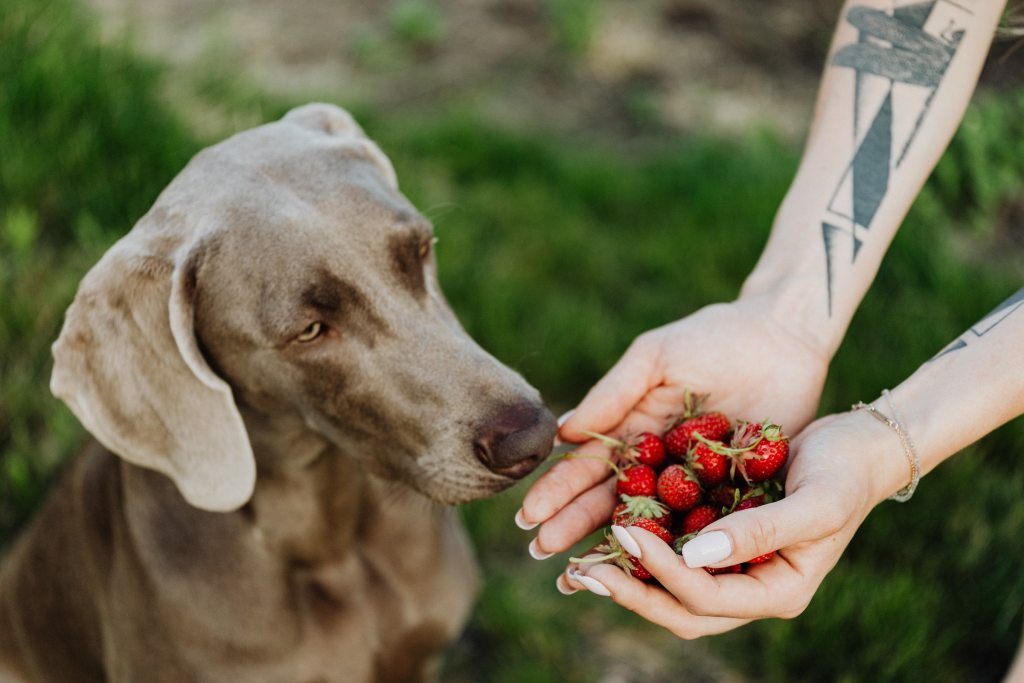
Not all human foods are safe to share with your canine friends, so it’s important to do your research before offering your dog a bite. Luckily, we’ve done a lot of the research for you, so all you need to do is read on to discover which fruits are safe for dogs. A few of the answers may surprise you.
So, what fruits can dogs eat? Here’s what veterinarians say about these 10 commonly found fruits. Before you know it, you and your pup will be ready for a trip to the farmer’s market!
Can dogs eat apples?
You’ll be happy to know that apples are just as nutritious for our dogs as they are for us. Even though dogs may not like certain kinds of apples, all varieties of this fruit are safe to share. Apples are full of vitamins A and C, though apple skin can cause stomach upset due to its high fiber content. A slice or two is a perfect daily amount, depending on your dog’s size.
Can dogs eat grapes?
Unlike apples, grapes are absolutely not safe to give to your dog. Though veterinarians are still figuring out why this fruit is toxic to dogs, it’s proven that grapes and raisins cause distressing symptoms in canines, even in small amounts. In severe cases, kidney failure and death can occur — so don’t risk it!
Can dogs eat watermelon?
Watermelon is one of the most refreshing summer fruits, and your pup doesn’t have to miss out. Seedless watermelon is safe for dogs to consume, especially with its high water and low-calorie content. Dogs should also not eat the watermelon rind, so cutting the fruit into chunks before serving might be the best idea.

Can dogs eat strawberries?
Good news! Strawberries are also safe and delicious for dogs — and they may even whiten your dog’s teeth. Be sure to feed this fruit in moderation, though, as it is higher in sugar than others.
Can dogs eat blackberries?
Blackberries are like most berries, so you should only feed them to your pup in moderation. They can cause stomach upset because of their fiber and sugar, though most dogs will be fine. Even wild blackberries are safe for dogs, but make sure you’re certain about what wild fruits you and your pet are eating.
Can dogs eat blueberries?
Yes, dogs can eat blueberries. This low-fat fruit has great antioxidant and anti-inflammatory properties. Most dogs can safely consume about 8 to 10 blueberries per day, though don’t be surprised if your furry friend asks for more.
Can dogs eat pineapple?
Although pineapple is safe for canine consumption, pet owners should proceed with caution. This fruit is high in both sugar and fiber, so some dogs can experience stomach upset or diarrhea.
Can dogs have mango?
Once you remove the skin and the pit of the mango, you can share a bite or two with your furry friend. Like all fruits, mangos should be fed in moderation. It’s especially important to remove the pit before sharing, because it can cause a choking hazard, intestinal blockage, or even potential cyanide poisoning.
Can dogs eat kiwi?
This green fruit is also safe for dogs in moderation, but owners should be extra careful to cut it into pieces before serving. Due to its small size, dogs can potentially choke on a whole kiwi if they try to eat it in one bite. The skin is also very high in fiber, so you should remove it before giving this fruit to your dog.
Can dogs eat cantaloupe?
This melon is similar to watermelon with its high water content, but it contains more sugar than its cousin. Still, cantaloupe is fine for dogs in small quantities, especially with the seeds and rind removed.
So, next time you get to make a fresh fruit salad, don’t be shy about tossing your pup a piece or two. As long as fruits aren’t packaged in syrup, veterinarian-approved produce is almost always safe to share. We think your dog will agree that it’s delicious, too!







